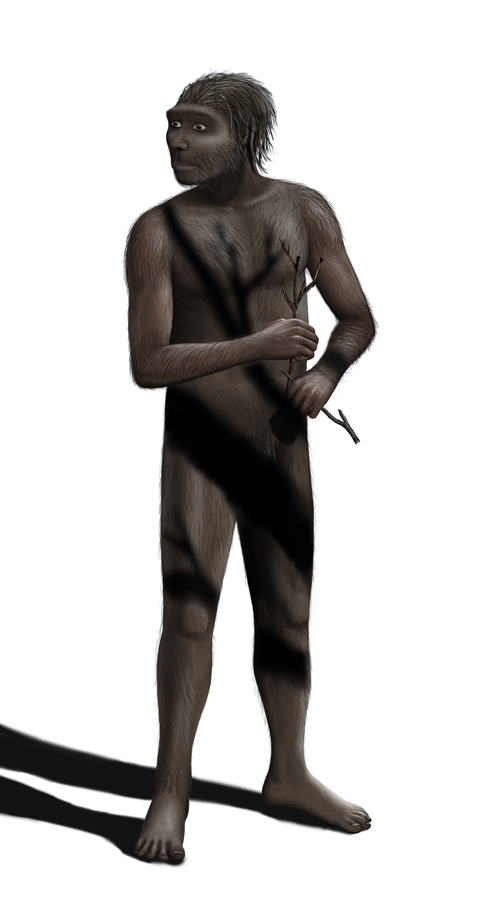Man Entered the Kitchen 1.9 Million Years Ago

Our ancient human ancestors may have put us on track toward meals a la Julia Child as long ago as 1.9 million years, according to new evidence that extinct hominids were cooking and processing their food. The finding may also explain modern humans' small teeth and guts (for some of us).
"We see a dramatic shift in the tooth size of Homo erectus, which means it was likely responding to a history already of eating cooked and processed food," study researcher Chris Organ, of Harvard University, told LiveScience. "If you're cooking your food you have many more hours of your day free, and you can spend those hours doing other things," since you don't have to eat as much to get your daily requirements.
Processed food is much easier to chew and digest and since chewing breaks up the food it means more surface area is available from which the gut can absorb nutrients, Organ said. The result means more available calories per serving and less gut time needed to digest those calories.
The only snag to their cooking hypothesis is that they haven't found evidence of hearths or fire pits for cooking that long ago.
Chew time
The researchers measured the tooth sizes and body masses of four extinct hominids, modern humans, chimpanzees and other modern apes, using this information from modern animals to estimate time spent chewing in the extinct species. Chimpanzees, they found, spend 10 times longer chewing and eating than humans do, 48 percent versus 4.7 percent of their days.
Humans are definite outliers in primate chew time, because we eat cooked and processed food. But our extinct relatives seemed to fall closer to us than to chimps regarding chewing. H. erectus (which lived 1.9 million years ago) spent 6.1 percent of its day feeding, while the more recent H. neanderthalensis spent 7 percent of the day feeding. Statistical analyses placed these chew times within the range of time spent chewing for humans.
Sign up for the Live Science daily newsletter now
Get the world’s most fascinating discoveries delivered straight to your inbox.
Looking back more than 2 million years to a more distant relative, the team found H. habilis spent about 7.2 percent of its time eating and H. rudolfensis 9.5 percent. While these numbers are much smaller than the modern chimpanzee eating times, they fall on the border of the modern human spectrum, so the researchers couldn't definitively say that their changes in molar size were due to different feeding behaviors.
"The time they spent eating was on the high range of what we see in human cultures. We are a little less sure about those two species," Organ said. "We stuck our flag in the sand with Homo erectus, because that's when we really start to see modern human-like feeding times, but it very well could have evolved earlier than that."
Where's the fire?
This extra time and calories likely had a large impact on the evolution of modern humans, and even the evolution of language and social lives, since you can't eat with your mouth full, and processing food can be a social activity, the researchers said.
"Cooking was a very important social trait for us as humans. We spend a lot of time in every single culture on the planet preparing food and cooking it," Organ said. "Our brains are very calorie hungry, so that also lets you feed a large brain. It also lets you walk and run a lot."
This cooking and processing would have included roasting over a fire and mashing with stones. Their diet would have included vegetables, tubers and various kinds of meat. The only snag: We haven't found evidence of fire-based cooking from this far in our past. The oldest evidence of fire use by hominids is around 1 million years ago.
"There isn't a lot of good evidence for fire. That's kind of controversial," Organ said. "That's one of the holes in this cooking hypothesis. If those species right then were cooking you should find evidence for hearths and fire pits."
Matt Sponheimer, a researcher at the University of Colorado at Boulder, who wasn't involved in the study, agrees that "food processing of one sort or another has played an important part in our history, and that such behaviors originated at least 2.6 Ma [million years ago]," Sponheimer told LiveScience in an email. He does note that the lack of evidence of mans' use of fire that early on could interfere with the finding's acceptance.
The study was published today (Aug. 22) in the journal Proceedings of the National Academy of Sciences.
You can follow LiveScience staff writer Jennifer Welsh on Twitter @microbelover. Follow LiveScience for the latest in science news and discoveries on Twitter @livescience and on Facebook.
Jennifer Welsh is a Connecticut-based science writer and editor and a regular contributor to Live Science. She also has several years of bench work in cancer research and anti-viral drug discovery under her belt. She has previously written for Science News, VerywellHealth, The Scientist, Discover Magazine, WIRED Science, and Business Insider.











